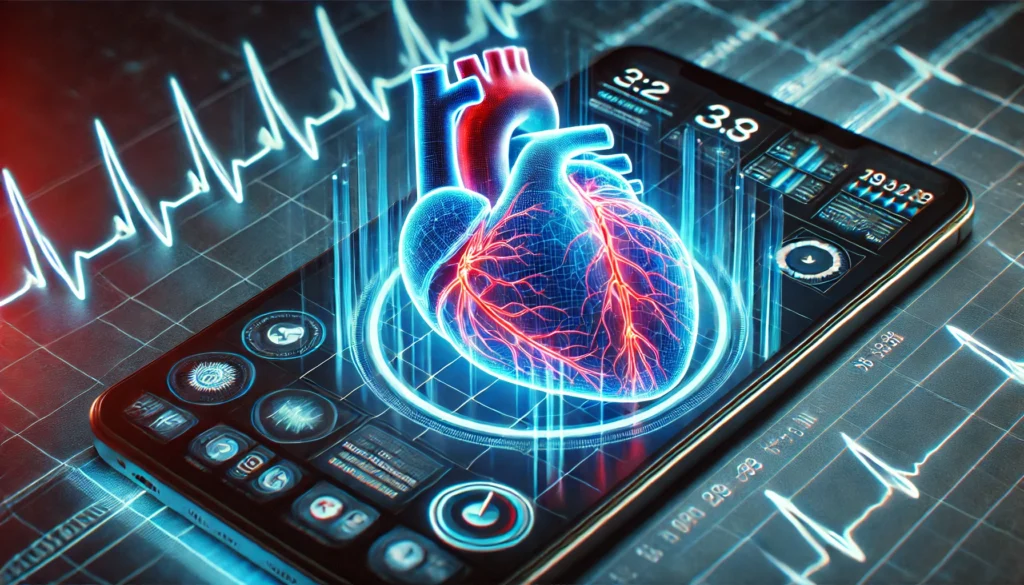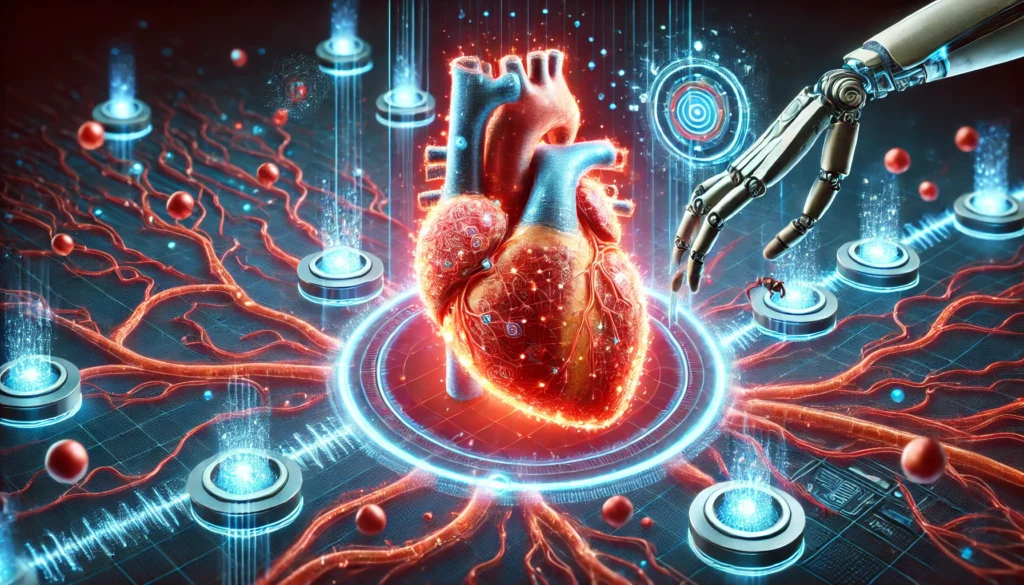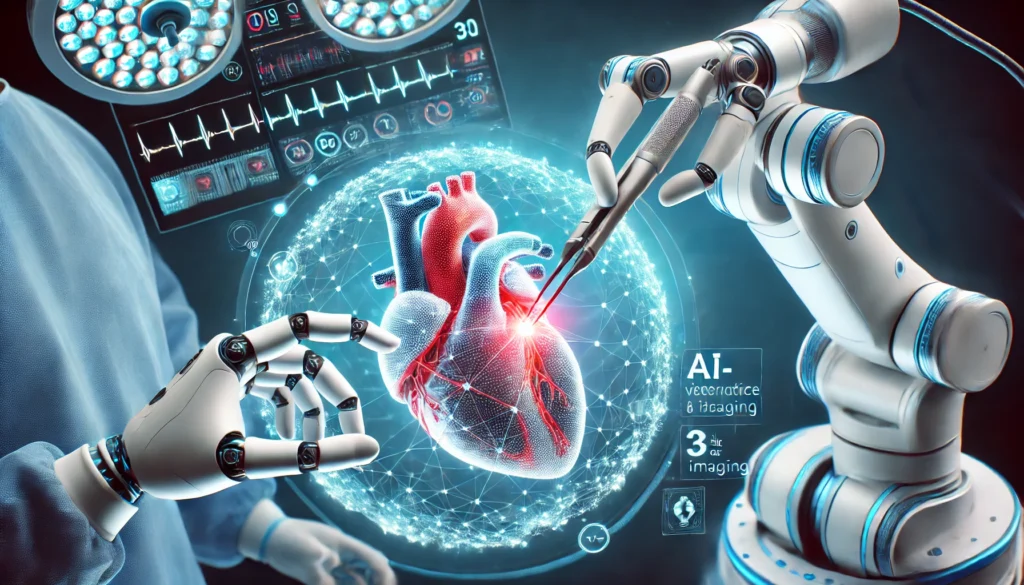The field of cardiology is continuously evolving, with groundbreaking research offering new insights into heart health care. Cardiovascular diseases remain a leading cause of morbidity and mortality worldwide, underscoring the importance of innovative approaches to prevention, diagnosis, and treatment. The latest advancements in heart health research provide hope for reducing the burden of heart disease through novel medical interventions, personalized treatment strategies, and lifestyle modifications. This article explores the most recent scientific discoveries that are shaping the future of heart health care, offering readers an in-depth understanding of how they can protect their hearts with evidence-based strategies.
You may also like: 5 Modern Treatments for Heart Disease: Advancements in Cardiac Care
Understanding Cardiovascular Diseases and Their Impact
Heart disease encompasses a range of conditions, including coronary artery disease, heart failure, arrhythmias, and valvular heart disorders. Each of these conditions presents unique challenges in diagnosis and management, requiring a multifaceted approach for effective care. The impact of cardiovascular diseases extends beyond individual health, affecting healthcare systems, economies, and overall life expectancy worldwide. Researchers continue to investigate the underlying mechanisms that contribute to heart disease, including genetic factors, inflammation, metabolic disorders, and environmental influences. By identifying key risk factors and developing targeted interventions, medical professionals can implement strategies that improve patient outcomes and reduce healthcare costs.
Advances in Heart Disease Prevention
One of the most significant areas of heart health care research focuses on prevention. Preventive cardiology emphasizes the importance of addressing modifiable risk factors, such as hypertension, high cholesterol, obesity, smoking, and sedentary lifestyles. Recent studies highlight the effectiveness of lifestyle modifications, including dietary interventions like the Mediterranean and DASH diets, which have been shown to reduce cardiovascular risk by improving lipid profiles, reducing inflammation, and supporting healthy blood pressure levels. Additionally, researchers are exploring the role of emerging pharmaceutical agents, such as PCSK9 inhibitors and SGLT2 inhibitors, in preventing heart disease by optimizing lipid metabolism and glucose control.

The Role of Genetics and Personalized Medicine in Cardiology
Genomic research has provided valuable insights into the genetic predisposition to heart disease, paving the way for personalized medicine approaches. Advances in genetic testing allow healthcare providers to identify individuals at higher risk for conditions like familial hypercholesterolemia and hypertrophic cardiomyopathy. Precision medicine, which tailors treatment based on genetic and molecular profiles, has revolutionized the management of cardiovascular conditions. Pharmacogenomics, the study of how genetic variations influence drug responses, enables clinicians to optimize medication regimens, minimizing adverse effects while maximizing therapeutic benefits. Personalized approaches to heart health care are expected to improve patient outcomes by targeting interventions to individual needs.
Breakthroughs in Cardiac Imaging and Diagnostics
Accurate and early diagnosis of heart disease is crucial for effective management. Recent advancements in cardiac imaging have enhanced the ability to detect cardiovascular abnormalities with greater precision. Innovations such as high-resolution magnetic resonance imaging (MRI), computed tomography (CT) angiography, and artificial intelligence-assisted echocardiography have improved the detection of coronary artery disease, myocardial infarction, and structural heart conditions. AI-driven diagnostic tools are increasingly being integrated into clinical practice, assisting healthcare providers in interpreting complex imaging data and identifying early markers of disease progression. These technological advancements are streamlining the diagnostic process, reducing the need for invasive procedures, and facilitating timely interventions.

Novel Therapies for Treating Heart Disease
The development of new therapeutic modalities has transformed the landscape of cardiovascular treatment. Gene therapy, regenerative medicine, and targeted biologic therapies are at the forefront of research, offering promising alternatives for patients with advanced heart disease. Stem cell therapy, for instance, has demonstrated potential in regenerating damaged heart tissue following myocardial infarction. Additionally, breakthroughs in drug development have led to the approval of novel anticoagulants, anti-inflammatory agents, and lipid-lowering medications that improve cardiovascular outcomes. The introduction of sodium-glucose co-transporter 2 (SGLT2) inhibitors has provided dual benefits in heart failure management by reducing cardiovascular events while also supporting kidney function.
The Impact of Digital Health and Wearable Technology
The integration of digital health tools into heart health care is revolutionizing patient monitoring and management. Wearable devices, such as smartwatches and fitness trackers, enable individuals to track key cardiovascular metrics, including heart rate variability, blood pressure, and physical activity levels. These technologies empower patients to engage in proactive heart health management while allowing healthcare providers to remotely monitor high-risk individuals. The use of mobile health applications and telemedicine platforms has expanded access to care, particularly in underserved regions, by providing real-time consultations and personalized health recommendations. As digital health solutions continue to evolve, their role in enhancing heart health care is expected to grow significantly.
The Future of Cardiovascular Research
Ongoing research in cardiology aims to uncover novel therapeutic targets, refine existing treatment strategies, and expand preventive measures. The application of artificial intelligence in predictive analytics is enhancing risk assessment models, enabling early identification of individuals at heightened risk for cardiovascular events. Furthermore, research into the gut microbiome and its connection to heart health is shedding light on the intricate relationship between diet, gut bacteria, and cardiovascular disease. The exploration of innovative therapies, such as RNA-based treatments and nanotechnology-driven drug delivery systems, holds promise for further advancing heart health care. Continued investment in cardiovascular research is essential for driving medical breakthroughs that improve patient outcomes and reduce the global burden of heart disease.

Frequently Asked Questions (FAQ) About Heart Health Care
1. What are some overlooked factors that contribute to heart disease?
While common risk factors such as high blood pressure, cholesterol, and smoking are well known, there are several lesser-discussed contributors to heart disease. Chronic stress, for example, can lead to prolonged inflammation, which damages blood vessels over time. Sleep disorders, particularly sleep apnea, significantly increase the risk of cardiovascular complications by depriving the body of adequate oxygen. Exposure to environmental pollutants, including air pollution and heavy metals, has also been linked to increased heart disease risk due to oxidative stress and systemic inflammation. Additionally, research suggests that social isolation and loneliness can contribute to poor heart health, as they are associated with higher levels of stress hormones and unhealthy lifestyle habits. Understanding these hidden risk factors is essential for a comprehensive heart health care approach.
2. How does gut health impact heart health?
Emerging research suggests a strong link between gut microbiota and cardiovascular health. Certain gut bacteria produce compounds that can either protect or harm the heart, depending on diet and microbial composition. For example, high consumption of red meat and eggs can increase levels of trimethylamine-N-oxide (TMAO), a byproduct linked to an increased risk of atherosclerosis. On the other hand, fiber-rich diets promote the growth of beneficial gut bacteria that produce short-chain fatty acids, which have anti-inflammatory properties and help regulate blood pressure. Probiotics and prebiotics are being explored as potential therapies to improve heart health by modulating gut microbiota composition. Understanding the connection between gut and heart health care can pave the way for personalized dietary strategies that reduce cardiovascular risk.
3. Can emotions and mental health influence heart disease risk?
Mental health plays a critical role in cardiovascular well-being, yet it is often overlooked in heart health care. Chronic anxiety and depression can lead to increased inflammation and elevated cortisol levels, both of which contribute to heart disease. Negative emotions can also trigger unhealthy coping mechanisms such as overeating, smoking, or alcohol consumption, all of which increase cardiovascular risk. Conversely, positive mental health practices such as mindfulness, meditation, and social engagement have been shown to reduce blood pressure and improve heart rate variability. Psychological interventions, including cognitive behavioral therapy (CBT), have demonstrated effectiveness in reducing stress-related cardiovascular events. Integrating mental health strategies into heart health care can significantly improve long-term outcomes.
4. What role does hydration play in maintaining heart health?
Proper hydration is crucial for optimal cardiovascular function, yet it is often underestimated in discussions about heart health care. Dehydration can lead to a reduction in blood volume, causing the heart to work harder to circulate blood, which can result in elevated heart rate and blood pressure. Studies indicate that chronic low water intake may contribute to an increased risk of heart failure due to the long-term strain on the heart. Hydration also affects electrolyte balance, which is essential for maintaining normal heart rhythm. Drinking adequate water throughout the day, particularly in hot climates or after physical exertion, supports efficient circulation and reduces the likelihood of cardiovascular complications. Ensuring sufficient fluid intake is a simple yet effective measure for heart health care.
5. Are plant-based diets more beneficial for heart health than animal-based diets?
The debate between plant-based and animal-based diets regarding heart health care continues to evolve with new research. Plant-based diets rich in whole grains, legumes, fruits, and vegetables have been consistently associated with lower cholesterol levels, reduced inflammation, and improved arterial function. These diets tend to be lower in saturated fats and higher in fiber, which supports healthy blood lipid profiles. However, well-balanced animal-based diets that emphasize lean proteins, omega-3 fatty acids, and nutrient-dense foods can also contribute to heart health. The key factor is the quality of food choices—processed meats and refined carbohydrates pose significant risks regardless of dietary preference. A balanced approach, incorporating nutrient-dense foods from both plant and animal sources, can support long-term cardiovascular well-being.
6. What is the impact of air pollution on cardiovascular health?
Air pollution has emerged as a significant but underappreciated factor in heart health care. Fine particulate matter (PM2.5) from vehicle emissions, industrial pollutants, and household combustion can penetrate deep into the bloodstream, triggering systemic inflammation and oxidative stress. Chronic exposure has been linked to increased risks of hypertension, heart attacks, and stroke. Research indicates that individuals living in urban areas with high pollution levels exhibit greater arterial stiffness and plaque buildup compared to those in less polluted regions. Protective measures such as using air purifiers, wearing masks in high-pollution areas, and supporting environmental policies aimed at reducing emissions can mitigate these risks. Addressing environmental factors is a crucial aspect of comprehensive heart health care.
7. How does sleep quality affect heart disease risk?
Sleep is a vital yet frequently overlooked component of heart health care. Poor sleep quality, characterized by insufficient duration, frequent disruptions, or untreated sleep disorders, has been associated with increased cardiovascular risk. Inadequate sleep leads to hormonal imbalances, increased cortisol levels, and heightened sympathetic nervous system activity, all of which contribute to hypertension and heart disease. Research has found that individuals with sleep apnea, a condition where breathing repeatedly stops during sleep, have a significantly higher risk of developing heart failure and arrhythmias. Prioritizing consistent sleep schedules, minimizing screen exposure before bedtime, and seeking medical intervention for sleep disorders can enhance cardiovascular health. Sleep hygiene is an essential yet often neglected factor in heart disease prevention.
8. What advancements in heart health care are being explored in regenerative medicine?
Regenerative medicine is one of the most promising frontiers in heart health care, offering potential solutions for repairing damaged cardiac tissue. Stem cell therapy aims to regenerate heart muscle cells lost after a heart attack, with ongoing clinical trials investigating its efficacy. Tissue engineering is another area of research focused on developing bioengineered heart patches and even 3D-printed heart tissue to restore function in patients with heart failure. Additionally, gene editing technologies such as CRISPR are being explored for correcting genetic mutations that predispose individuals to heart disease. While these therapies are still in experimental stages, they represent a transformative shift toward repairing rather than merely managing cardiovascular conditions. Continued investment in regenerative medicine holds great potential for reshaping heart health care in the coming decades.
9. What are the potential risks and benefits of intermittent fasting for heart health?
Intermittent fasting has gained popularity as a dietary strategy with potential heart health benefits, but it is essential to evaluate both its advantages and risks. Studies suggest that intermittent fasting can improve insulin sensitivity, reduce inflammation, and promote weight loss, all of which contribute to better cardiovascular outcomes. Fasting also encourages autophagy, a cellular process that helps clear damaged cells and may support vascular health. However, some individuals may experience negative effects, such as electrolyte imbalances, increased stress hormone levels, or disrupted metabolism if fasting is not approached correctly. Those with existing cardiovascular conditions should consult a healthcare provider before implementing intermittent fasting to ensure it aligns with their overall heart health care plan. A well-structured fasting regimen can be beneficial, but individual factors must be considered.
10. How can wearable technology improve heart health monitoring?
Wearable technology is revolutionizing heart health care by providing real-time monitoring and early detection of cardiovascular abnormalities. Smartwatches and fitness trackers equipped with electrocardiogram (ECG) and pulse oximetry sensors enable users to track heart rate variability, detect irregular heart rhythms, and monitor oxygen saturation levels. Some advanced devices can even alert users to potential atrial fibrillation, allowing for early medical intervention. Beyond individual benefits, aggregated wearable data is being used in large-scale studies to identify population-wide trends in heart disease risk factors. While wearable technology is not a substitute for professional medical evaluations, it offers a valuable tool for proactive heart health management. Integrating these devices into daily routines empowers individuals to take a more active role in their cardiovascular care.
Conclusion: Embracing Innovation for a Heart-Healthy Future
The latest advancements in heart health care underscore the importance of a multifaceted approach to preventing and treating cardiovascular disease. From precision medicine and genetic research to digital health technologies and novel therapeutics, the field of cardiology is experiencing unprecedented progress. By staying informed about emerging research and adopting evidence-based strategies, individuals can take proactive steps to protect their hearts and enhance overall well-being. As scientific discoveries continue to shape the future of cardiovascular care, embracing innovation will be key to reducing the prevalence of heart disease and improving quality of life for generations to come.
cardiovascular wellness, heart disease prevention, cardiac health research, blood pressure management, heart-friendly diet, cholesterol control strategies, cardiovascular fitness, lifestyle changes for heart health, heart disease risk factors, innovative heart treatments, digital health monitoring, heart failure management, personalized cardiology, regenerative medicine for heart, heart attack prevention, wearable heart monitors, stress and heart disease, nutrition for heart wellness, sleep and cardiovascular health, exercise for heart function
Further Reading:
Digital health technology in the prevention of heart failure and coronary artery disease
Discovery could prevent heart failure
Breakthroughs in Heart Disease: New Ways to Bust Clots
Disclaimer
The information contained in this article is provided for general informational purposes only and is not intended to serve as medical, legal, or professional advice. While MedNewsPedia strives to present accurate, up-to-date, and reliable content, no warranty or guarantee, expressed or implied, is made regarding the completeness, accuracy, or adequacy of the information provided. Readers are strongly advised to seek the guidance of a qualified healthcare provider or other relevant professionals before acting on any information contained in this article. MedNewsPedia, its authors, editors, and contributors expressly disclaim any liability for any damages, losses, or consequences arising directly or indirectly from the use, interpretation, or reliance on any information presented herein. The views and opinions expressed in this article are those of the author(s) and do not necessarily reflect the official policies or positions of MedNewsPedia.


